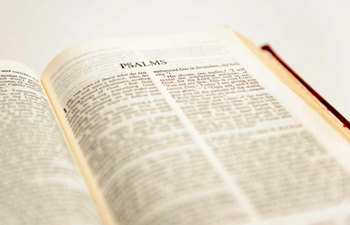Blessed are those whose strength is in you, in whose heart are the highways to Zion.
-- Psalm 84:5 (ESV)
We sat in a circle of desks, and the psalm sat in front of each of us -- a psalm in which the writer longs to inhabit the house of God, to walk the roads to Jerusalem in the company of fellow pilgrims.
What I longed for that morning, as I sat with my students and led them through lectio divina, was to shake off the pressures of guiding and teaching.
I longed to pray with them, and as the words fell out of my mouth, I couldn’t help but hear my own sense of separation and longing, anxiety and hope: “Now is the time for lectio, for written prayer. Whatever this word is speaking to you, whatever you need to pray, put down on the page. God hears us and loves us; let us pray together.”
I approached -- or rather, returned to -- lectio divina because I was forced to, out of both classroom necessity and spiritual need. I teach a spiritual writing course, where my students create and revise a series of spiritual memoirs. We use lectio as a writing exercise, and as a time of meditation and prayer.
I knew that I needed something as ancient, and as inviting, as lectio for my students, whose own prayer habits often feel lacking to them. If we were going to write spiritual memoirs, we needed the Scriptures to anchor us as we walked our own “highways to Zion.”
But I needed lectio, too. I had read about the desert fathers and mothers, and I saw that if I was to fight my selfish impulses, I needed to imitate them somehow. I needed solitude, reflection and a clearer eye for reading the text of my heart.
I had encountered lectio divina, or holy reading, before. In college, guided by a gifted teacher, I practiced the traditional lectio steps: reading, meditation, prayer, contemplation.
I felt the silence of the room wrap itself around me, stilling my anxious heart. I lingered on one of the psalm’s central verses: “I would rather be a doorkeeper in the house of my God than dwell in the tents of wickedness” (v. 10).
I thought about my conversion, how I would rather have lingered at God’s doorstep than kept dwelling in the dark places I had long known. I cried, and prayed, and left feeling cleansed, loved and whole.
Lectio divina, when practiced correctly, helps the reader hear Scripture without any sort of hermeneutical or exegetical trick: the goal is prayer, communion, encounter with God. If Scripture has the power to transfigure us, lectio brings us into prayer that is neither self-absorbed nor inaccessible -- it reorders both word and impulse, our thoughts and words constantly hemmed in by the words of Scripture. “O Lord God of hosts, hear my prayer” (v. 8).
But in lectio, like all spiritual disciplines, that reordering is exhausting; if cleansing the heart is anything like cleaning my house, it is much easier to keep the lights off than to see the overloaded sink. And, whether out of laziness or out of fear, I did not return to the psalm, or to the practice of lectio.
A spiritual discipline is not a thing to be owned, nor is it something to toss around whenever I feel the urge to be “spiritual.” To examine the heart, you must cooperate with the grace offered you -- and I am finding that grace is more gritty, less ethereal, than I expect it to be. That “the way up,” as T.S. Eliot writes, is “the way down,” and that most of that way down is marked by failure.
This is exactly what writer Jana Riess encounters in her memoir “Flunking Sainthood,” an account of Riess’ yearlong experiment with spiritual disciplines. In her month of lectio divina, Riess recognizes that meditating on the Scriptures brings her face to face with her own “hard-headedness,” particularly when she is brought to face Jesus’ anger in the Gospel of Mark: Do you not see or understand?
Maybe this was the real reason I strayed from lectio -- in some way, holy reading reveals what I do not see or understand about my faults, the blindness of my own heart. Without a community with which to pray, lectio became voyeuristic, a cheap escape that I once indulged, more tourist trap than pilgrimage.
If the desert monastics have shown me anything, it is that the spiritual life is no escape. The desert brings you face to face with your weakness. But in lectio’s hold -- and in whatever desert you find yourself -- you are given space to wrestle with text and word, anxiety and confusion.
Like Jacob, the wrestling both wounds and blesses. It brings you down to raise you up. And it sends you walking the highway marked for you, eyes opened to finally see who it is that journeys with you.
Every time we sit in my spiritual writing class to practice lectio, I see my students learn to rest in the Scriptures, see it feed and nurture them in ways they do not expect. Their sighs, their silence, confront me every time. Could it be that, despite my assumptions about leading them, they are the ones who are leading me?
It is an unexpected mercy, to see these young people as fellow pilgrims on the way. And it is also a mercy to feel the silence wrap around me once more, a solid presence of the holy. To find the words of my own prayer -- Lord, have mercy -- blend with the sound of pencils scribbling.
To know that the prayer is both mine and ours, a song of ascent I could not find on my own.









